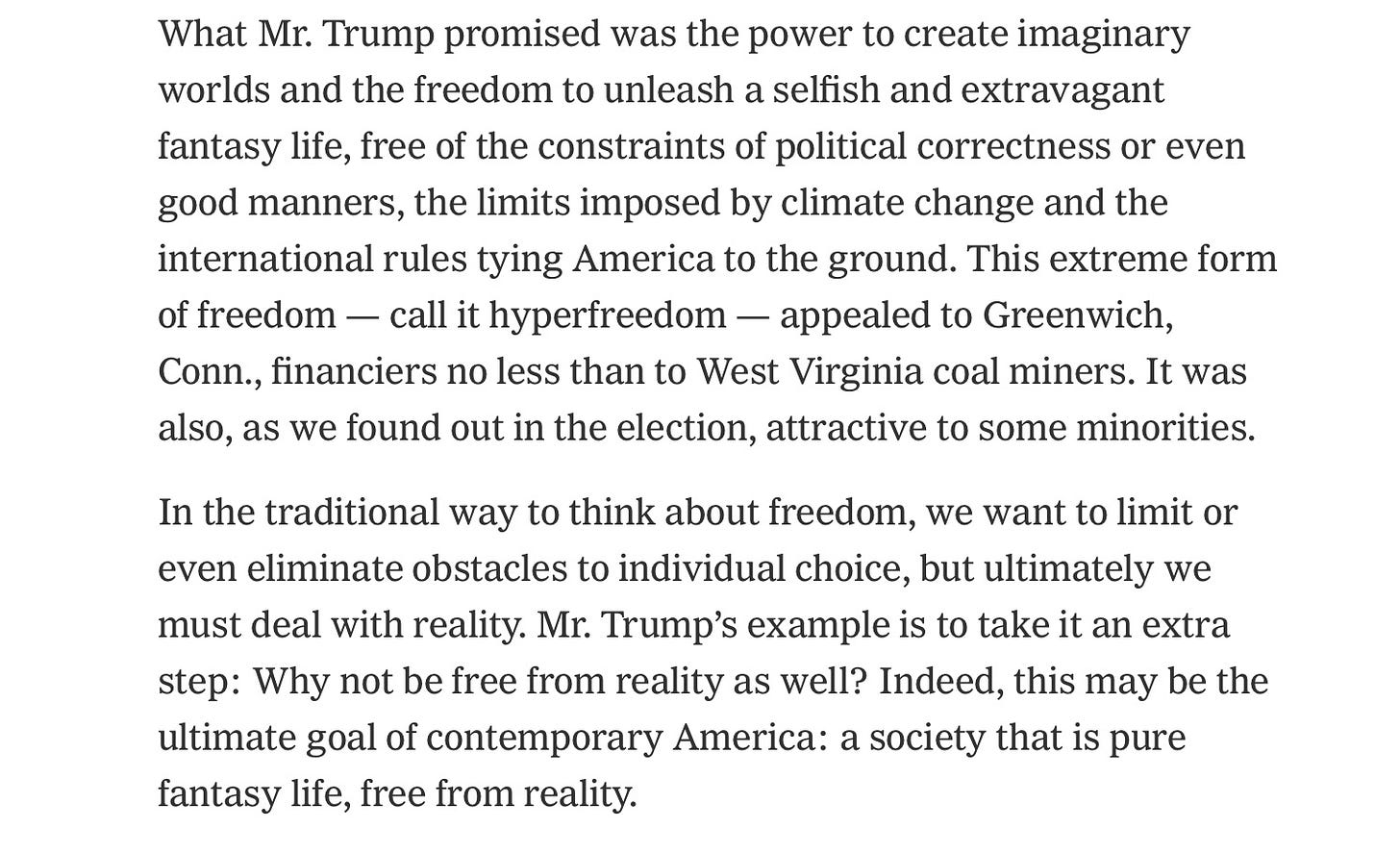In my article in the New York Times today I devote some lines to a new concept that in my view deserves the central place in contemporary political thought:
The argument is an attempt to make sense of the Trump years in a way that markedly deviates from the consensus on what Trump stood for. Commentators such as Jeet Heer have argued that Trump promised his followers the return to an earlier and simpler era. Nothing could be farther from the truth. Trump was not a traditionalist politician. On the contrary, he took existing trends in modern American society and took them to a kind of natural but nonetheless extreme conclusion.
Nor was Trump a symbol of perennial possibilities in democratic politics: the demagogue, the tyrant, the “Face in the Crowd.” No, he represented something new: the moment when, drunk with the possibilities of technology, we start to dream that human beings can actually live a fantasy life. We used to have fantasies. Now we live them out. The effect is intoxicating, like chocolate or candy for creatures whose biology prepared them for life in the savannah.
In his interview with the Atlantic’s Jeffrey Goldberg, Barack Obama has some fascinating reflections on this question. Perhaps influenced by the media consensus on Trump, he initially tries to see him as an authority figure - the prototypical protofascist - only to confess his puzzlement: “I think about the classic male hero in American culture when you and I were growing up: the John Waynes, the Gary Coopers, the Jimmy Stewarts, the Clint Eastwoods, for that matter.” But is that Trump? No, rather the opposite: “And so even if you are someone who is annoyed by wokeness and political correctness and wants men to be men again and is tired about everyone complaining about the patriarchy, I thought that the model wouldn’t be Richie Rich—the complaining, lying, doesn’t-take-responsibility-for-anything type of figure.” How did Trump succeed then? Later in the interview Obama comes close to the truth, although predictably he still recoils from accepting it. Trump is not a figure of authority but a figure of freedom - freedom understood as the realization of every desire, no matter how extreme, in the here and now - and therefore someone representing powerful and growing forces in contemporary American society. Perhaps Trump pointed towards the future rather than the past. As Obama puts it: “It’s interesting—people are writing about the fact that Trump increased his support among Black men, and the occasional rapper who supported Trump. I have to remind myself that if you listen to rap music, it’s all about the bling, the women, the money. A lot of rap videos are using the same measures of what it means to be successful as Donald Trump is. Everything is gold-plated. That insinuates itself and seeps into the culture.”
Read this good essay by Evan Osnos. It shows how Trumpism had a powerful appeal for Greenwich financiers, sophisticated creatures in many respects but addicted - more than most - to the pleasures of fantasy. And that is why I conclude my article today arguing that “sooner rather than later, Trumpism is bound to return.”






Excellent article. Something I’ve been thinking about and researching quite often recently: Hyperfreedom. This line of thought was triggered when thinking about game/virtual worlds and the extent to which they’ve become the new “third place”. With this trend comes feverish objections from boomers and “journalists” about screen time, fantasy, escapism, “loneliness epidemics”, etc. However, I see this as nothing more than human nature. The standard test of, say, the Venture Capitalist, is finding the threshold between a visionary and a con-artist. Humans construct “worlds” in which we can live, move and have our being. Early cave dwellers imagined worlds and painted them on the walls; campfire stories; oral tradition promised lands; books up to and through video games. Our dumb, repetitive lives, the immediacy of NOW we seek escape from. That’s the offline. Axial-Age religions/shamans/philosophers are very much rooted in this desire to escape circular models of attaching ourselves to a cyclical metaphysical principle and to an unfolding narrative in which we play a part. We matter in this linear narrative. We can imagine a future, summon and mobilize individuals, even across genetic boundaries, and hope/fight/direct toward that future. it’s rooted in fantasy, imagination, and storytelling. We seek the Online...that emergence from the everyday, cyclical boredom of life when we’ll matter. many people feel they don’t matter. They don’t have an agency. They decisions amount to nothing. They’ve not participated in the growth, wealth, policy, etc. And, we’ve not had a picture or a good fantasy with storytelling, juicy enemies, characters, etc. America is a land rooted in fantasy, story, and the irreal. A wonderful book to read is Fantasyland by Kurt Andersen; The Image by Daniel Boorstin; and always to remember the (supposedly) Karl Rove quote: "We're an empire now, and when we act, we create our own reality. And while you're studying that reality — judiciously, as you will — we'll act again, creating other new realities, which you can study too, and that's how things will sort out. We're history's actors ... and you, all of you, will be left to just study what we do."